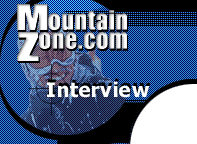classic.mountainzone.com |
| ||||||||||||||||||||||||||||||||||||||||||||||||||
| |||||||||||||||||||||||||||||||||||||||||||||||||||
| |||||||||||||||||||||||||||||||||||||||||||||||||||||||||||||
 |
 | |||||||||||||||||||||||||||||||||||||||||||||||||||
 | ||||||||||||||||||||||||||||||||||||||||||||||||||||
 |
 | |||||||||||||||||||||||||||||||||||||||||||||||||||
Pioneer, Legend, Guru... After talking to him for a half hour, with a camera stuck in his face, I can tell you that he is also: thoughtful, reflective, experienced, exposed, and deep. In an industry where depth refers only to snowpack, the fact that Kelly talks about spirituality, connectedness, and being in tune with the mountains, makes him a standout. At the same time, he seems to have no interest in standing out. After spending years in the snowboarding limelight, he's had enough fanfare. Though he holds seven World Championship titles, it's been nearly a decade since Kelly competed. These days, he concerns himself completely with backcountry riding, which, he is quick to point out, is merely a venue for riding — not a way to do it. As ski areas became more and more crowded in the late '80s, he and many riders like him were simply forced to look for the goods out of bounds.
"Four or five days after a storm, we could still have our way with the mountain," says Kelly. "I've always been into powder — that's what I like riding. And now you have to go further to get it. So I've been pushed out there further," he says. Turns out, that's not such a bad thing. Kelly earns most of his turns these days (at least those that aren't serviced by a SnowCat or helicopter), spending many hours enveloped in the great wide open. It has become a sort of spiritual playground for him. Backcountry became not just a place, but a state of mind.
"There's just a feeling you get from certain things you do in life that just kind of feel pure and independent of what's actually, physically, going on. All of a sudden you have this feeling of clarity. Backcountry snowboarding has really done a lot to boost that feeling in me," he says. Though he lives and breathes a snowboarding life, he's not quite in line with the culture of snowboarding. "I've actually been pretty out of touch with mainstream snowboarding for five or seven years, maybe even since I quit competing. I don't ride ski areas all that much, and I don't do contests and I don't go to snowboard shops and I rarely read the snowboard magazines. So I'm a little bit out of touch. Probably the average consumer, the average person seeing this interview, would probably know more about the sport than I do. "But I prefer it that way because what I do, my experience and what I do in snowboarding, is really pretty independent of snowboarding and the more independent it is, the more pure and better I feel about snowboarding." That's not so surprising, considering all of the hype and the world of difference between the quiet solitude of an untouched high-alpine glade and the DJ'ed, bro-brah, name-tossing, go-big-or-go-home atmosphere of today's contests. The latter has a pretty short shelf life. "I see a lot of attention coming to young riders that are really good but I hope, for their sake, and their love of snowboarding, that they'll get to go through the phase that I went through, of being intensely interested in progression: getting somewhere as a pro, and then finding a release for that," he says. "Because if you go too far with it, it's pretty hard to stay in love with the sport." In order to sustain that love, Kelly takes a pretty holistic approach to the sport. "I'm 33 now, and I can't take the hard landings like I used to, and I know my body needs maintenance, so I've been doing yoga for about six years and that was a purely physical thing to help my back, but now I realize after a yoga session, even if I'm not going snowboarding that day, I just feel something inside of me that sort of feels like a spiritual boost. "I can't say I have any interest in Buddhism or Taoism, but I like to practice Tai Chi; it makes me feel good as well. So I think there is something there, and over time it'll probably mold more into one direction or another, but right now, it's more of a vague feeling."
He also helps spread the gospel of snow safety. He travelled to Japan this winter to help instruct an avalanche awareness course. "It's pretty common for pro snowboarders to have to go to Japan for promotional events. It's usually jumping off an icy kicker at a flat ski area at some weird Japanese resort that's really not that much fun to ride. After 10 years of doing that pretty non-productive stuff I just realized that I don't even want to go to Japan if I'm going to do that," he says. The Japanese never ventured into the backcountry until a few years ago, "once enough American media and American pros came to Japan and basically pillaged the powder," he says. Kelly says that for the Japanese it's like "living on a beach and never being allowed to get into the water at all, until all of a sudden you're an adult and you want to go surfing, but you don't even know how to swim." This isn't Kelly's first foray into education. He operated a summer snowboard camp in Blackcomb from 1988 to 1998, and recently spent a night riding with a group of underprivileged kids being taught to snowboard through a Burton-sponsored program called Chill. So what's left for this veteran pro to do? Plenty. As long as Burton keeps making boards, he'll keep riding and helping design them; as long as it keeps snowing, he'll find new terrain to explore; as long as there's more to learn about himself and mountains, he'll learn it. — Mary Catherine O'Connor, MountainZone.com Staff  | ||||||||||||||||||||||||||||||||||||||||||||||||||||